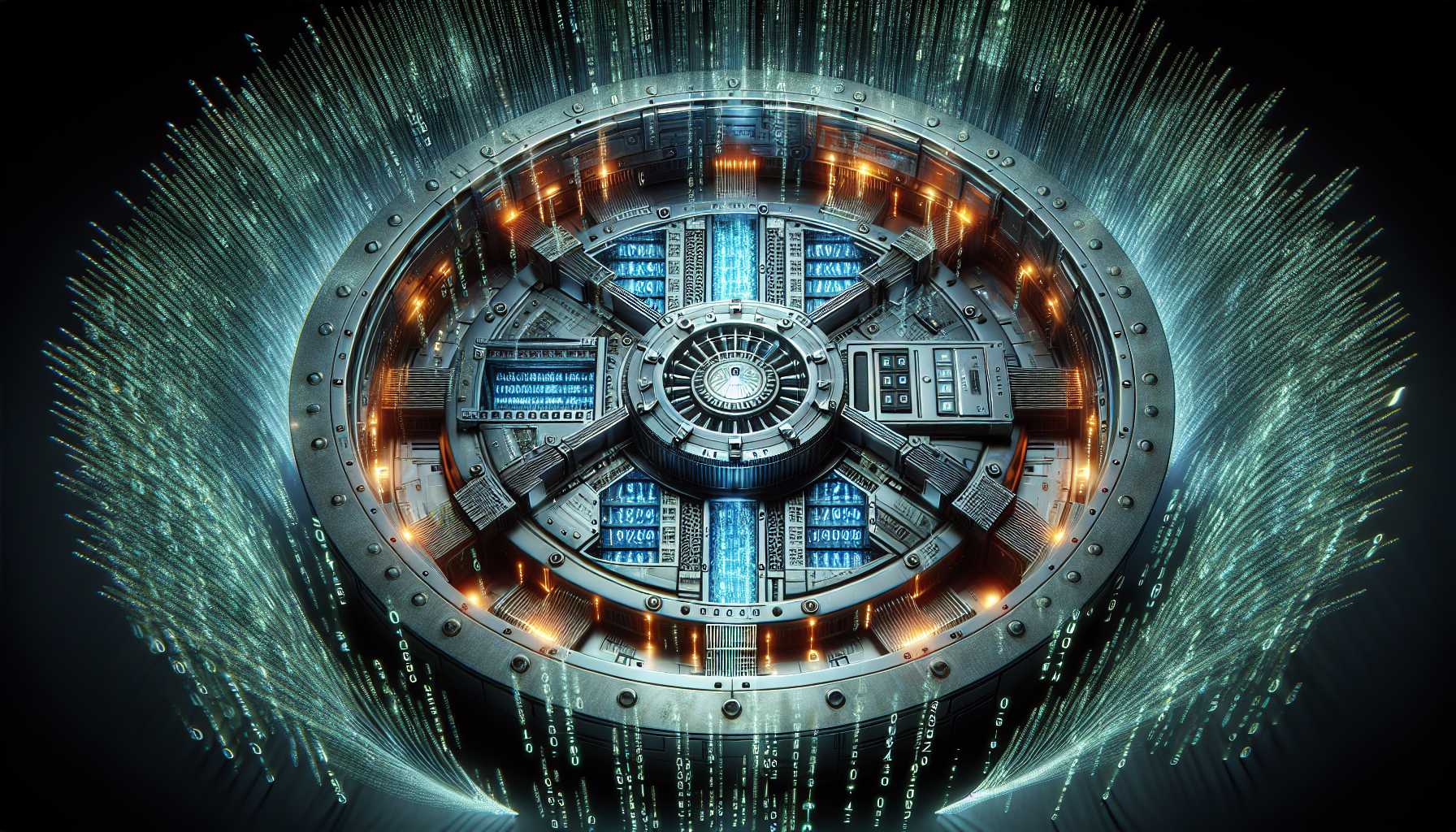The Framework for Security: A Modern Tech Company’s Challenge
 In the labyrinth of internet security, it feels like we’re tracing Theseus’ steps, fighting Minotaurs in the form of hackers. The latest victim to feel the wrath of these modern-day mythological beasts is Framework, the U.S. laptop maker applauded for its steadfast commitment to the right-to-repair movement. As a tech enthusiast and avid promoter of cybersecurity, witnessing Framework battle the consequences of a phishing attack, which compromised their customers’ personal data, is a stark reminder of our shared online vulnerabilities. The breach at Framework wasn’t a high-tech heist; it was old-school social engineering. Hackers cunningly impersonated the CEO and lured an employee of their accounting service provider, Keating Consulting, into handing over customer data sheets like they were passing a note in class. The casualty list included email addresses and outstanding purchase balances, the digital equivalent of name tags for ambitious hackers. In light of this, Framework’s swift action to implement mandatory phishing training for employees strikes me as a necessary march toward a more fortified digital fortress.
In the labyrinth of internet security, it feels like we’re tracing Theseus’ steps, fighting Minotaurs in the form of hackers. The latest victim to feel the wrath of these modern-day mythological beasts is Framework, the U.S. laptop maker applauded for its steadfast commitment to the right-to-repair movement. As a tech enthusiast and avid promoter of cybersecurity, witnessing Framework battle the consequences of a phishing attack, which compromised their customers’ personal data, is a stark reminder of our shared online vulnerabilities. The breach at Framework wasn’t a high-tech heist; it was old-school social engineering. Hackers cunningly impersonated the CEO and lured an employee of their accounting service provider, Keating Consulting, into handing over customer data sheets like they were passing a note in class. The casualty list included email addresses and outstanding purchase balances, the digital equivalent of name tags for ambitious hackers. In light of this, Framework’s swift action to implement mandatory phishing training for employees strikes me as a necessary march toward a more fortified digital fortress.
Holographic Humor: A.I. Channels George Carlin’s Ghost
 The uncanier valley just got a laugh track, courtesy of Dudesy, an AI on a comedy crusade. It’s sidestepped the realm of synthetic stand-up by conjuring up an hour-long YouTube “special” that resonates with the legendary George Carlin’s lexicon. However, as a tech observer and comedy consumer, I can’t help but feel that the essence of what makes comedy impactful – the hearty blend of human experience and a live, authentic voice – was lost in translation. This technological parody delivers a sophisticated mimicry, but the nuance of Carlin’s social commentary is sorely missed. Artificial Intelligence hijacking a comedian’s legacy feels like a high-tech puppet show, devoid of the soul that only true performers like Carlin can bring to the stage. Kelly Carlin’s poignant take resonates with creatives across the board: AI might replicate, but it can never replace the human touch in art.
The uncanier valley just got a laugh track, courtesy of Dudesy, an AI on a comedy crusade. It’s sidestepped the realm of synthetic stand-up by conjuring up an hour-long YouTube “special” that resonates with the legendary George Carlin’s lexicon. However, as a tech observer and comedy consumer, I can’t help but feel that the essence of what makes comedy impactful – the hearty blend of human experience and a live, authentic voice – was lost in translation. This technological parody delivers a sophisticated mimicry, but the nuance of Carlin’s social commentary is sorely missed. Artificial Intelligence hijacking a comedian’s legacy feels like a high-tech puppet show, devoid of the soul that only true performers like Carlin can bring to the stage. Kelly Carlin’s poignant take resonates with creatives across the board: AI might replicate, but it can never replace the human touch in art.
EleutherAI’s Ethical Odyssey in Data for Language Models
 The world of AI is caught in the whirlwind of ethical debates, and at the eye of this storm is EleutherAI. Their project, the Pile dataset, is an 825 GB compendium of diverse texts excavated to feed the insatiable appetite of language models like GPT-4. As someone who’s been closely following the evolution of AI, I’m both intrigued and cautious about EleutherAI’s braving the legal tempest with its new version, the Pile v2. Reprehensions over large AI training datasets have skyrocketed, especially post the emergence of tools like ChatGPT. EleutherAI’s insistence that model training is a facet of fair use is a bold stance amidst crashing waves of copyright concerns. The nuanced approach to compiling the Pile v2 – delicately balancing diversity, quality, and legal permission – is commendable, yet their endeavor walks a tightrope over an abyss of complex legal and ethical scrutiny.
The world of AI is caught in the whirlwind of ethical debates, and at the eye of this storm is EleutherAI. Their project, the Pile dataset, is an 825 GB compendium of diverse texts excavated to feed the insatiable appetite of language models like GPT-4. As someone who’s been closely following the evolution of AI, I’m both intrigued and cautious about EleutherAI’s braving the legal tempest with its new version, the Pile v2. Reprehensions over large AI training datasets have skyrocketed, especially post the emergence of tools like ChatGPT. EleutherAI’s insistence that model training is a facet of fair use is a bold stance amidst crashing waves of copyright concerns. The nuanced approach to compiling the Pile v2 – delicately balancing diversity, quality, and legal permission – is commendable, yet their endeavor walks a tightrope over an abyss of complex legal and ethical scrutiny.
Unstitching the Fabric of Credential Stuffing
 Credential stuffing stands as a grim reminder that our cybernetic walls are as penetrable as the password we whimper out in hushed tones when trying to recall it. The security breach of 23andMe rams home the reality that our digital guardians–our passwords–are woefully inadequate knights in today’s cyberwarfare. Personal, sensitive information is up for the taking, sold in the blink of an eye to anyone willing to venture into the digital black market. As a tech advocate, I believe it’s a gargantuan oversight to underestimate this particular threat vector. Companies may be the custodians of our data, but the lance of defense must first be picked up by us, the users. The widespread recycling of passwords is akin to leaving our front doors unlocked, inviting in digital prowlers with an internet connection and a modicum of persistence. It’s high time we adopted password managers, rid ourselves of digital lethargy, and embraced unique passwords as if our digital lives depended on it – because they do. In the digital Colosseum where privacy and security are constantly put to the test, these stories underscore the fragility of our current defenses. Whether it’s through revamping our approach to cybersecurity protocols like Framework, questioning the ethical ramifications of AI’s capabilities alongside EleutherAI’s efforts, or combating the pervasive threat of credential stuffing with robust personal policies, our quest for digital resilience continues. For Framework, sealing the cracks in their digital armor is not just about repairability; it’s about protecting the trust that customers place in proponents of the right-to-repair. As for Dudesy’s Carlin impersonation, it’s a tech-driven novelty act that provokes reflection on the boundaries of AI in creative domains, ultimately amplifying the chorus that yearns for humanity in art. The evolution of EleutherAI’s Pile dataset stands as a pivotal contribution to AI research, balancing on the tension wire of progress and privacy. Finally, my personal takeaway is this: We are the guardians of our digital realm. Taking proactive steps to employ complex passwords, employ password managers, and embrace multifactor authentication can turn the tide in the war against cybercrime. The paths we choose now will inform our digital future, determining if we emerge as victors or vanquished in the ever-evolving battle against cyber threats.
Credential stuffing stands as a grim reminder that our cybernetic walls are as penetrable as the password we whimper out in hushed tones when trying to recall it. The security breach of 23andMe rams home the reality that our digital guardians–our passwords–are woefully inadequate knights in today’s cyberwarfare. Personal, sensitive information is up for the taking, sold in the blink of an eye to anyone willing to venture into the digital black market. As a tech advocate, I believe it’s a gargantuan oversight to underestimate this particular threat vector. Companies may be the custodians of our data, but the lance of defense must first be picked up by us, the users. The widespread recycling of passwords is akin to leaving our front doors unlocked, inviting in digital prowlers with an internet connection and a modicum of persistence. It’s high time we adopted password managers, rid ourselves of digital lethargy, and embraced unique passwords as if our digital lives depended on it – because they do. In the digital Colosseum where privacy and security are constantly put to the test, these stories underscore the fragility of our current defenses. Whether it’s through revamping our approach to cybersecurity protocols like Framework, questioning the ethical ramifications of AI’s capabilities alongside EleutherAI’s efforts, or combating the pervasive threat of credential stuffing with robust personal policies, our quest for digital resilience continues. For Framework, sealing the cracks in their digital armor is not just about repairability; it’s about protecting the trust that customers place in proponents of the right-to-repair. As for Dudesy’s Carlin impersonation, it’s a tech-driven novelty act that provokes reflection on the boundaries of AI in creative domains, ultimately amplifying the chorus that yearns for humanity in art. The evolution of EleutherAI’s Pile dataset stands as a pivotal contribution to AI research, balancing on the tension wire of progress and privacy. Finally, my personal takeaway is this: We are the guardians of our digital realm. Taking proactive steps to employ complex passwords, employ password managers, and embrace multifactor authentication can turn the tide in the war against cybercrime. The paths we choose now will inform our digital future, determining if we emerge as victors or vanquished in the ever-evolving battle against cyber threats.







